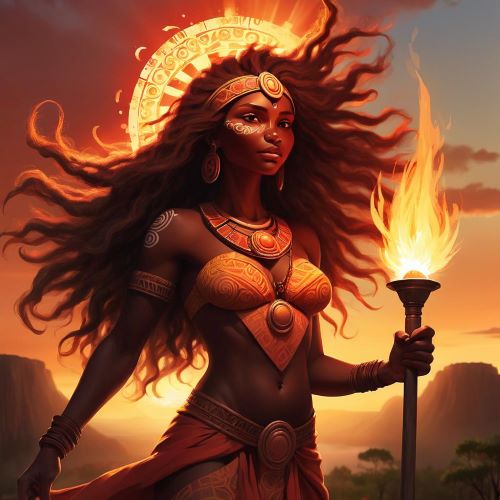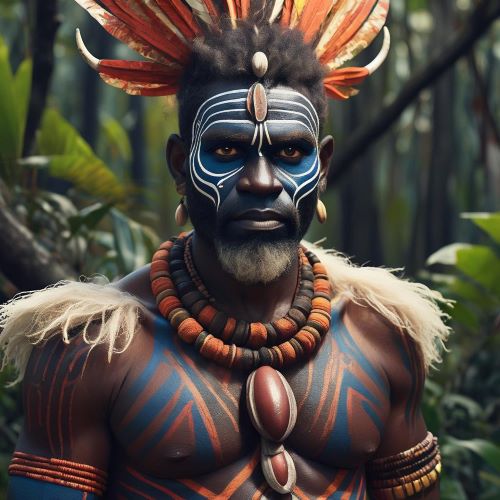Yolngu Gods
Yolngu Gods are central to the mythology and spiritual beliefs of the Yolngu people, Indigenous Australians from Arnhem Land in the Northern Territory. These divine beings are not gods in the Western sense but ancestral spirits who created the land, shaped the laws of existence, and continue to influence the living world. Deeply embedded in every part of Yolngu life, these ancestral gods form the heart of a belief system that ties people to country, kinship, and ceremony. Through songlines, dance, and sacred art, the stories and teachings of these beings are passed down through generations, ensuring that Yolngu culture remains vibrant and deeply connected to the Dreaming.
Among the most revered Yolngu Gods are the ancestral creators known as the Djang’kawu Sisters. These powerful beings are said to have travelled across the land, giving birth to clans, naming places, and establishing the customs and laws that guide Yolngu society. They are associated with the Dhuwa moiety, one of two major divisions that structure Yolngu cosmology, kinship, and ceremony. Alongside them are other spirit-beings like Barama and Lany’tjung, linked to the Yirritja moiety, who played similar roles in forming the landscape and laws. These gods and goddesses embody balance, responsibility, and the interwoven nature of all things.
Yolngu spirituality teaches that the land itself is alive with the presence of these gods, and each geographic feature—from rivers to rocks—carries the memory and essence of the ancestors. Through ceremonial practices, Yolngu people connect with these ancestral beings, reinforcing their relationship with the land and each other. Sacred rituals involving music, dance, and storytelling bring the gods to life, ensuring that their influence remains active and present. Each songline—a path across the land created by the travels of ancestral gods—is both a physical trail and a spiritual guide, holding vast knowledge and authority.
The Yolngu Gods are also closely linked to moral and social order. They established laws that define proper behavior, family structures, and the responsibilities of each person within the community. These laws, known as “Madayin,” are sacred and are considered to be handed down directly from the ancestral gods. Violating these laws is not just a social issue but a spiritual one, disrupting the balance and requiring ceremonial resolution. Thus, Yolngu gods are seen not only as creators but as custodians of justice, guardians of tradition, and enforcers of cosmic harmony.
Today, the Yolngu continue to honor their gods through ceremonies, oral tradition, and art. Despite the pressures of colonization and modern influences, Yolngu spirituality remains strong, with elders, artists, and cultural leaders preserving the teachings of the gods for future generations. Their stories are increasingly shared with the wider world through song, dance, and visual storytelling. Understanding Yolngu Gods offers a profound glimpse into a worldview where spirit, land, and people are inseparable, and where divine presence shapes every aspect of life.
Yolngu Gods are central to the mythology and spiritual beliefs of the Yolngu people, Indigenous Australians from Arnhem Land in the Northern Territory. These divine beings are not gods in the Western sense but ancestral spirits who created the land, shaped the laws of existence, and continue to influence the living world. Deeply embedded in every part of Yolngu life, these ancestral gods form the heart of a belief system that ties people to country, kinship, and ceremony. Through songlines, dance, and sacred art, the stories and teachings of these beings are passed down through generations, ensuring that Yolngu culture remains vibrant and deeply connected to the Dreaming.
Among the most revered Yolngu Gods are the ancestral creators known as the Djang’kawu Sisters. These powerful beings are said to have travelled across the land, giving birth to clans, naming places, and establishing the customs and laws that guide Yolngu society. They are associated with the Dhuwa moiety, one of two major divisions that structure Yolngu cosmology, kinship, and ceremony. Alongside them are other spirit-beings like Barama and Lany’tjung, linked to the Yirritja moiety, who played similar roles in forming the landscape and laws. These gods and goddesses embody balance, responsibility, and the interwoven nature of all things.
Yolngu spirituality teaches that the land itself is alive with the presence of these gods, and each geographic feature—from rivers to rocks—carries the memory and essence of the ancestors. Through ceremonial practices, Yolngu people connect with these ancestral beings, reinforcing their relationship with the land and each other. Sacred rituals involving music, dance, and storytelling bring the gods to life, ensuring that their influence remains active and present. Each songline—a path across the land created by the travels of ancestral gods—is both a physical trail and a spiritual guide, holding vast knowledge and authority.
The Yolngu Gods are also closely linked to moral and social order. They established laws that define proper behavior, family structures, and the responsibilities of each person within the community. These laws, known as “Madayin,” are sacred and are considered to be handed down directly from the ancestral gods. Violating these laws is not just a social issue but a spiritual one, disrupting the balance and requiring ceremonial resolution. Thus, Yolngu gods are seen not only as creators but as custodians of justice, guardians of tradition, and enforcers of cosmic harmony.
Today, the Yolngu continue to honor their gods through ceremonies, oral tradition, and art. Despite the pressures of colonization and modern influences, Yolngu spirituality remains strong, with elders, artists, and cultural leaders preserving the teachings of the gods for future generations. Their stories are increasingly shared with the wider world through song, dance, and visual storytelling. Understanding Yolngu Gods offers a profound glimpse into a worldview where spirit, land, and people are inseparable, and where divine presence shapes every aspect of life.



